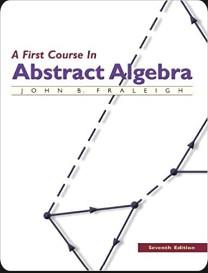Let G be a group, and let P(G) be the set of all subsets of G. For
Question:
Let G be a group, and let P(G) be the set of all subsets of G. For any A, B ∈ P(G), let us define the product subset AB = {ab | a ∈ A, b ∈ B}.
a. Show that this multiplication of subsets is associative and has an identity element, but that P(G) is not a group under this operation.
b. Show that if N is a normal subgroup of G, then the set of cosets of N is closed under the above operation on P(G), and that this operation agrees with the multiplication given by the formula in Corollary 14.5.
c. Show (without using Corollary 14.5) that the cosets of N in G form a group under the above operation. Is its identity element the same as the identity element of P( G)?
Data from Corollary 14.5
Let H be a normal subgroup of G. Then the cosets of H form a group G / H under the binary operation (aH)(bH) = (ab)H.
Proof: Computing, (aH)[(bH)(cH)] = (aH)[(bc)H] = [a(bc)]H, and similarly, we have [(aH)(bH)](c H) = [(ab )c ]H, so associativity in G / H follows from associativity in G. Because (aH)(eH) = (ae)H = aH = (ea)H = (eH)(aH), we see that eH =H is the identity element in G/ H. Finally, (a-1 H)(aH) = (a-1a)H = eH = (aa-1)H = (aH)(a-1 H) shows that a1H = (aH)-1•
Step by Step Answer:






